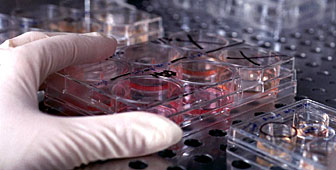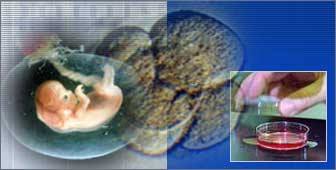Stem cell research gets government backing

The government has come out in favour of using human embryonic stem cells for research in Switzerland.
A draft law permits the importation of stem cells and the use of surplus embryos under strict conditions.
“This is the most liberal law that we can push through within the present constitution,” said Gérard Escher, advisor to the secretary of state for science.
The legislation allows the production of stem cells from surplus embryos up to 14 days old and research on the embryos themselves.
The embryos, which normally come from in-vitro fertilisation, would otherwise have been destroyed.
The bill allows the import and export of stem cells and the storage of stem cell lines so that they are available to all researchers.
Strict conditions
However, it forbids the creation of embryos purely for research purposes and bans therapeutic cloning.
Presenting the bill on Wednesday, the interior minister, Ruth Dreifuss, said the issue posed a social dilemma and it was therefore necessary to lay down clear guidelines.
“Surplus embryos are not people but they’re also not things,” she said. “That’s precisely why we need a law.”
It is not certain how parliament will react to the bill. Politicians might approve the use of stem cells for research, but not research on the embryos themselves.
“It will have a short, rough ride in the beginning and then I think it will be a very rational debate,” Escher told swissinfo.
Embryo numbers
Precise information about the number of embryos stored in Switzerland is still being collected.
According to government statistics, around 1,000 fertilised egg cells are stored in Swiss reproduction clinics for the purposes of artificial insemination. However, Escher told swissinfo the true figure may be in the region of 3-5,000.
For various reasons they can no longer be used for their original purpose and are due to be destroyed by the end of 2003.
To be fit for use as a source of stem cells, the fertilised egg cells would have to be cultivated for longer. During the subsequent extraction of the stem cells, the embryo would be destroyed.
“It is the first time that politicians and lawyers are regulating the aims and frontiers of research and not only the risk of research,” Dr Rainer Schweizer, a legal rights expert at St Gallen University, told swissinfo.
“We must accept that these decisions could be wrong in two or three years and must be modified on the basis of new knowledge.”
Other clauses in the new law call for the consent of the couple whose fertilised egg cells are being used; proof that no other line of research could achieve the same ends; and permission from either the federal office for health or the relevant ethics commission for the work to go ahead.
The use of embryos and stem cells for commercial purposes is forbidden.
Novel therapies
Embryonic stem cells can be transformed into almost any other cell in the body. Experts believe that they may eventually lead to treatments for a range of serious illnesses including Alzheimer’s, Parkinson’s, cardiovascular diseases and some cancers.
Cell replacement therapy and tissue engineering are two key areas of application.
“When I listen to many researchers, they all want to work on embryonic stem cells,” said Escher. “They grow better than adult stem cells, they behave better, they last longer, they divide more, and they are hardier.
“I think that in ten to 15 years, the adult stem cells will win out because then we will know how to manipulate any cell in the body – not only stem cells.”
Compromise
“From an international point of view, the Swiss draft is middle of the road,” said Thomas Cueni, general secretary of Interpharma.
“On the one hand, you have countries [Britain and Sweden] which have very liberal regulations including the ability for therapeutic cloning within the first two weeks of the life of an embryo.
“On the other hand, you have countries [Germany] with very restrictive rules, or rules where you allow importation but you can’t produce stem cells in the country itself.
“I think the Swiss compromise, which basically opens the door to research but is based on very stringent ethical rules and for the benefit of research on diseases that cannot be cured yet, is a reasonable one.”
Rapid passage
Market estimates on the potential use of human stem cells assume that the market will grow in an explosive manner.
According to studies published by the Technology Assessment Centre in Bern, the worldwide market volume stood at $400 million (SFr587 million) in 2000. It is estimated that this will rise to $12.9 billion by 2005, and $57.7 billion by 2010.
The draft law is expected to take about 18 months to pass through parliament. It has undergone public consultation since May.
The impending destruction of pre-2000 embryos by the end of 2003 has added a sense of urgency to its passage. Dreifuss called for the bill to be dealt with quickly in parliament “so that the legal uncertainties could be cleared up”.
swissinfo, Vincent Landon
The Swiss government backs the use of embryonic stem cells for research.
Scientists can use surplus embryos but not create embryos for their work.
Therapeutic cloning would also be banned, unlike in Britain.
Many countries already allow embryonic stem cell research, including Sweden, the Netherlands, Australia, Israel and China.

In compliance with the JTI standards
More: SWI swissinfo.ch certified by the Journalism Trust Initiative











You can find an overview of ongoing debates with our journalists here . Please join us!
If you want to start a conversation about a topic raised in this article or want to report factual errors, email us at english@swissinfo.ch.